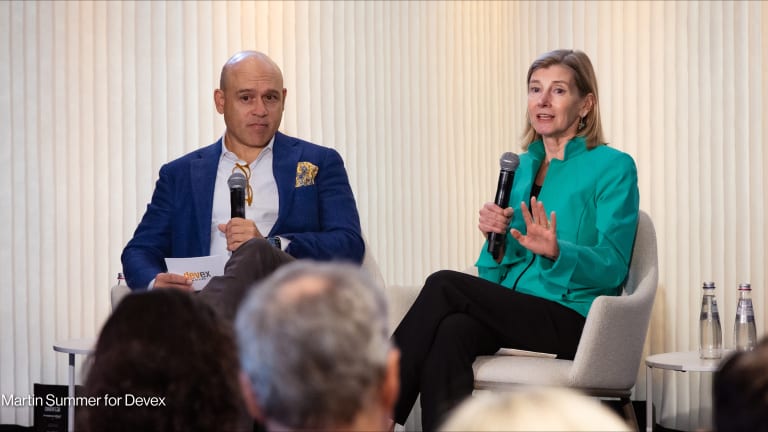Save the Children US CEO details how they navigated the budget crash
Janti Soeripto reflects on “overcommunicating,” making mistakes, and other lessons after U.S. foreign assistance was decimated.
Imagine seeing nearly a third of your annual global program budget vanish overnight. Save the Children was one of many organizations hit by a financial gut punch when the Trump administration ground all U.S. foreign assistance to a halt earlier this year. So it went into rapid response mode, said Janti Soeripto, CEO of Save the Children US. “Our biggest priority in that initial month was trying to figure out what is the lifesaving work that is terminated and that we have to continue so that no children die on our watch in the immediate term? So that is very clarifying when you have that front and center, because everything else almost falls away,” Soeripto said at Devex Impact House on the sidelines of the 80th United Nations General Assembly. Soeripto said that while Save the Children “made loads of mistakes” as it navigated those early days of tumult, “I think what we did well is we told our staff early, we’re going to make lots of mistakes, and we’re going to own up to them,” she said. “So we overcommunicated to staff all the time, even if it meant that … we have to say we don’t know.” “Now I think we're getting to a phase where a lot of that — yes, painful and sometimes heartbreaking though it was — we’re seeing not only green shoots of recovery, but we’re also seeing a path towards rebound and also a path towards reform,” she added. “Because, let’s be very honest, we knew in this industry that there were tons of things that we’d like to see different, that were not ideal, that were inflexible, that were inefficient, that were duplicative, that we'd like to see better.” One of the things she’d like to see the development community do better is learn lessons from the private sector. “I spent 20 years in the private sector, and I always thought it was interesting that in the private sector, it was very competitive with your direct competitors, and you wouldn’t talk to each other, but you would do deals together,” she said. “In this industry, it’s almost the other way around. We talk a lot, we like each other, we have fun meetings, but then we don’t do the deals because there is no financial incentive to do them, right? And now there is,” Soeripto added, citing “nonsexy stuff” such as combining procurement. “I mean, yeah, it’s not going to change the world, but if it saves us millions of dollars, I'll take it.” The aid sector will also have to do a better job of selling itself. “We have to do a ton better to explain how important our mission is, how kick-ass we are at finding some solutions and making them sustainable, and then compelling people to join our mission,” she said. Lastly, acceptance is key to moving forward. “You do have to radically accept your reality,” Soeripto said, noting all the talk she’s heard about programs coming back, legal action reversing decisions, etc. “And we’re like, let’s assume that that is not the case. Nothing is coming back and nothing will be repaired, right? And then if something comes back, it’s a cherry on top.”
Imagine seeing nearly a third of your annual global program budget vanish overnight. Save the Children was one of many organizations hit by a financial gut punch when the Trump administration ground all U.S. foreign assistance to a halt earlier this year.
So it went into rapid response mode, said Janti Soeripto, CEO of Save the Children US.
“Our biggest priority in that initial month was trying to figure out what is the lifesaving work that is terminated and that we have to continue so that no children die on our watch in the immediate term? So that is very clarifying when you have that front and center, because everything else almost falls away,” Soeripto said at Devex Impact House on the sidelines of the 80th United Nations General Assembly.
This story is forDevex Promembers
Unlock this story now with a 15-day free trial of Devex Pro.
With a Devex Pro subscription you'll get access to deeper analysis and exclusive insights from our reporters and analysts.
Start my free trialRequest a group subscription Printing articles to share with others is a breach of our terms and conditions and copyright policy. Please use the sharing options on the left side of the article. Devex Pro members may share up to 10 articles per month using the Pro share tool ( ).
Anna Gawel is the Managing Editor of Devex. She previously worked as the managing editor of The Washington Diplomat, the flagship publication of D.C.’s diplomatic community. She’s had hundreds of articles published on world affairs, U.S. foreign policy, politics, security, trade, travel and the arts on topics ranging from the impact of State Department budget cuts to Caribbean efforts to fight climate change. She was also a broadcast producer and digital editor at WTOP News and host of the Global 360 podcast. She holds a journalism degree from the University of Maryland in College Park.








